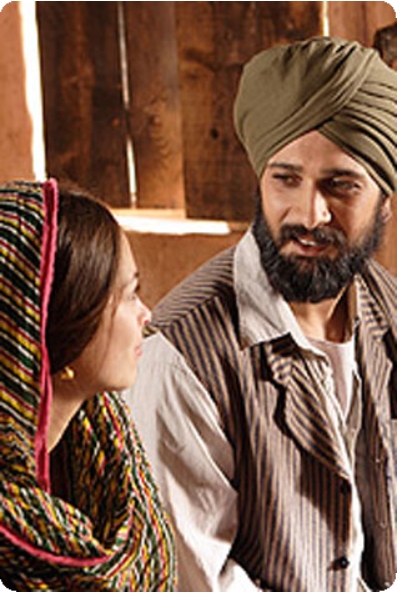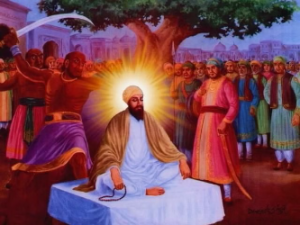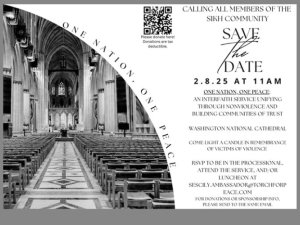Letters From Espanola

In September, I was blessed to attend a conference focusing on the Universal Message of Guru Granth Sahib at the gurdwara in San Jose, California, USA. The conference was co-sponsored by the Gurdwara San Jose, the Chardi Kalaa Foundation and SikhNet.com.
I shared a paper on Guru Arjan's four letters to Guru Ram Das, known as Shabad Hazaaray. On how those letters can give an insight about the true nature of love.
The people at the conference enjoyed the presentation very much, and I appreciated their kind words about it. However, at the very end of the day, a lovely young Sikh man, in his late 20's, came to speak with me. He said, "I am of a marriageable age. How do I go about choosing a partner?"
I am embarrassed to say that I did not really have a good answer for him. I started talking about how marriages that lasted were because the partners just somehow "knew" that they were right for each other. And how he should develop his intuition through simran.
He listened to me respectfully, but I could tell my words did not give him what he needed.
So I have been thinking deeply about his question for the last month, and wanted to share my thoughts about it.
Mind you, I am a middle-aged single woman who has lived a very singular life. I was not born Sikh, and in my early 20's, I was a bit of a wild child. Relationships started for me in a way that modern Western media tends to glorify. What I can say from experience is that this approach is not a bad short-term strategy, but not really a great long-term one.
So to answer this young man who asked such a heart-felt question, I would like to share some insights from my own life. And if they help him or anyone to understand partnerships better, then something positive might come from my own life journey.
The first thing I want to say is that just because you love someone does not mean that you will be able to live with them for the rest of your life. This is one of the most painful and important lessons I have learned. You can love someone deeply, but that person may not necessarily be the right life partner.
Why? Because a life partner depends on more than just love. Life partners need a shared vision of life. Shared values. A shared sense of direction. These things matter as much, if not more, than being "in love" with someone.
Singh Sahib Harbhajan Singh ji Yogi once gave a lecture where he said to women, "Do not make decisions based on being in love."
I asked him, then what do you base your decisions on?
He replied: "Values, virtues and character."
I think this is a really great framework for everyone. Being in love can blind you a little bit. You may go to bed with the physical beauty of a person. But you wake up with their character. So study the character of the other person first.
What are their habits? What are their values? What are their virtues? And will the character, values and virtues bring something positive to your life?
To make a good decision about a life partner, I would offer that you need two things. A certain set of skills and a process.
SKILLS
When it comes to partnership, what skills are good to bring to the table? The first skill is Simran. You cannot really succeed in any relationship with anyone until you first establish your relationship between your own inner being and your own mind. That relationship has to come first.
So know yourself. Have a connection to your core. Do something spiritual for yourself every day. Have roots with your own being. It will keep you steady because all relationships involve ups and down. Your own steadiness within yourself will see you through the good and the tough times.
Then, I would offer - find out if you can do simran with your potential partner. The family that prays together, stays together. To me, this is one of the most critical skills between partners. Can you do your banis, or sing kirtan, or do simran together? Sharing a spiritual practice, believe it or not, can really solve a lot of problems in the sacred space before they make it to time and space.
The second skill that I would suggest you bring to the table is something I call Authentic Allowing. Too often, in the search for partnership, we twist ourselves into something that we think we should be in order to gain the approval of another. It is a very human, fallible reality that can happen in partnership. But in time, we will want to drop the mask and be loved for who we actually are. And if our partner rejects us, that can lead to pain and resentment.
You need a certain courage to just be as authentic as possible with another person.
And then, allow them to be as authentic as possible with you. This is where simran is so critical. Do not seek your sense of self worth from another person. Do not make it a life or death issue whether someone will accept you. Just be you. Just give the other person profound permission to be who he or she is.
If in that Authentic Allowing, a genuine connection of enjoyment and appreciation gets created, you have found something worthwhile.
The third, incredibly critical, skill is Communication. And communication begins with listening. Reflective listening is one of the most important lessons you can learn for every type of relationship. Reflective listening means - I listen to what you say and before I respond, I tell you what I have heard. "What I hear you saying is ..." This type of skill helps during moments of conflict. So bring really good reflective listening skills to the table.
The other side of good communication is that you communicate from your consciousness, not from your emotions. It is okay to feel things. But do not inject your emotions into another person. To say, "I am angry with you because of x, y and z; and I need such and such from you!" is far better than to yell and scream and break things.
So speak consciously, not emotionally. These skills will help build trust and intimacy in a relationship.
PROCESS
The second aspect to finding partnership has to do with the process you go through together. I think it is important for people to be honest with each other. If you would like a marriage partner, state it up front. If the other person is not ready for marriage and you are, let them walk away. If you just want to have a good time, say it up front. You will find someone else who also wants a good time.
Do not fake it, just be real and let your authentic truth attract the person who matches what you are looking for.
When it comes to marriage, here is the other painful and important lesson I have learned in my life. Marriage is like founding a company. You will create a home with another person. And the home is kind of like a business for the heart. So what is your vision for your home life? What is the purpose of your home? What is your job description for your potential mate? And what do you have to offer?
Write it all out. Discuss it with each other. Money. Sex. Family. Work. Food. Chores ...
Spend time thinking about what you need from your home life in all of these areas. What are your negotiables? What are your non-negotiables? Create a blue print for what you want to build spiritually, emotionally, psychologically, physically in your home. And dialogue with your potential partner about it. See if you can come up with a common vision and common direction.
It might seem very unromantic on a certain level. But of course, see if you can have fun together. Dining and movies and concerts and all of that. But the fact is, marriage is mostly a diplomatic negotiation between two people across all these home business areas.
So if you will spend the rest of your life dealing with these things, then invest the time talking about them upfront. Maybe even write a document that talks about your goals, and agreements. And be willing to revisit that document every year or so.
Think it through. See if the other person will be a good business partner for the company you want to build called a home and family.
Yogi ji also said ‘Be friends first‘.
Spend time building a friendship. Because when challenges and tests come in relationship, friendship can see you through.
Now let me say a word about sex. Our religious teachings say no sex until after you are married. The reality is not everyone will listen to that. So what I would advise is very simple. No sex until both partners are absolutely sure they are ready to take that step together. Sex should not come early, in my opinion.
Wait to see that the other conversations feel very positive before taking that step. If both partners choose to wait until marriage, great. If both partners feel comfortable with sex earlier, fine. If one partner wants to wait and the other creates pressure and does not have the patience to wait, that potentially could be a deal breaker.
Sex needs trust and builds trust. So make sex a trust building activity in the relationship, not an animal urge that needs a release.
Doing simran together can help with that.
Skills and process. Friendship. Character. Values. Virtues. Know that you can love someone but it may not be the right life partner. Invest the time to think about what your home needs to be.
Think about it like a company. Talk about it. Come up with a common vision and common direction. Those are my suggestions to help you find the person who you could have a lifetime of success with.
This is not a traditional arranged marriage approach. This is not a romantic love approach. This is about two people making an intelligent decision for themselves, together.
One last word, and I know this may be unpopular, but it needs to be said.
The ancient Romans had a very fascinating approach to marriage. One that every religion today would object to, but that makes a tremendous amount of sense from the perspective of human nature. In Ancient Rome, among the nobles, the marriage contract happened in two phases. The first phase was for one year. People got married and at the end of one year, they had the option to renew the contract for life or to walk away.
No matter how much you try to get to know someone, or plan or listen to family members, the fact is - you do not know if it is going to work until you actually live together.
Many marriages fall apart in the first year. And frankly, that is human nature.
If someone hits you, get out. If someone screams and disrespects you, get out. If someone steals from you, get out.
Life is a precious gift. Nobody has to endure the unendurable. Do not feel bad if it does not work out. Cut your losses and move on.
But if it does survive that first year, then you probably have the ability to go the distance. Stay committed. Work it out. Do your best.
And remember, life is a journey. Let the Guru be your guide.
Please know that I do not mean to offend anyone by anything in this essay. Sometimes I think we put too much pressure on our young people to live up to an ideal that may not be realistic.
And I just wanted to share a few thoughts from my own experience about the Partnership Question. I hope the young man who spoke to me at the conference reads this essay, and I pray that these thoughts will be of some use to you.





